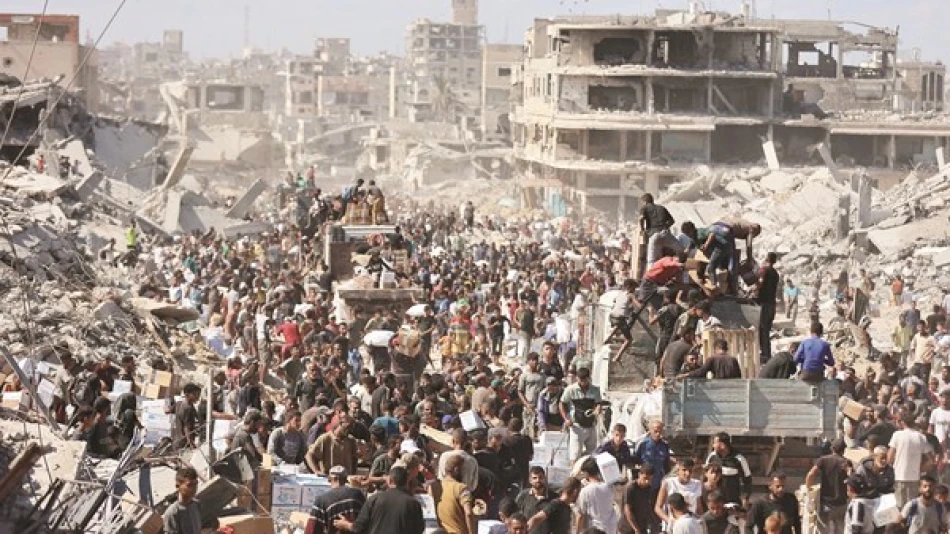
Gaza Prepares for Prisoner Exchange: Anticipation Builds as Captives Await Homecoming
Israel, Hamas, and the US announced they're close to releasing Israeli hostages and Palestinian prisoners, just as an international summit on Gaza kicks off in Sharm el-Sheikh under Egyptian and American leadership. The prisoner exchange could happen as early as Monday, with 20 living Israeli hostages set to be freed in exchange for Palestinian prisoners - including some high-profile names that Hamas is pushing for.
Indirect talks between Hamas and Israel continued Sunday in Egypt's Sharm el-Sheikh to finalize the prisoner swap details. Hamas is insisting that the final list of Palestinian prisoners includes what sources call "the big six" - notably Fatah leader Marwan Barghouti and Popular Front for the Liberation of Palestine Secretary-General Ahmad Saadat.
Egypt, Qatar, and Turkey have been working hard as mediators to bridge the remaining gaps and nail down the final arrangements.
Palestinian sources say Hamas has finished all preparations for the exchange. They've moved the 20 living Israeli hostages to several secret locations across Gaza and told them they'll be released Monday as part of the war-ending agreement. The handover will happen without any public ceremonies or celebrations.
An Israeli government spokesperson confirmed they expect all 20 living hostages to be released at once, starting early Monday morning. She added that Israeli forces have already pulled back to what's called the "yellow line." The Palestinian prisoners will only be freed after Israel confirms all their hostages have crossed the border safely.
**The Sharm el-Sheikh Summit**
Monday also marks the start of an international peace summit for Gaza at the Sharm el-Sheikh resort, with Egyptian President Abdel Fattah el-Sisi and US President Donald Trump leading the event. Egypt announced that 20 countries have confirmed their attendance.
The summit aims to put the finishing touches on the Gaza ceasefire agreement between Hamas and Israel. Sessions will focus on stopping the fighting, getting urgent humanitarian aid in, and restarting a comprehensive political process that ensures Palestinian rights and regional stability.
**Life After the Ceasefire**
Thousands of Palestinians started heading north toward Gaza City on Sunday, despite warnings from rescue workers about unexploded ordnance and bombs scattered throughout areas that saw heavy Israeli attacks over the past two months. Returning residents described widespread destruction.
Humanitarian aid trucks began entering Gaza through the Kerem Shalom crossing. Videos showed residents gathering along roadsides, trying to get food and water amid widespread famine across the territory.
**What Comes Next**
Palestinian analysts see this ceasefire as the start of something genuinely different, backed by intense regional and international efforts. There's clear American determination to make this stick and create new political realities in Gaza.
Dr. Ayman al-Raqab, a political science professor at Al-Quds University, says successfully implementing the first phase will make the later stages easier. But the second phase - which involves disarming Hamas - faces serious discussions right now. The key is avoiding a security vacuum in Gaza.
Al-Raqab stressed that the US needs to factor this in while pressuring Israel for balanced compromises, especially regarding light weapons that Hamas wants to keep. Rebuilding Gaza will need an international conference down the road, plus a national administrative committee under Palestinian Authority oversight and unified police force.
Dr. Mohammed Abu al-Fahm from the Popular Organizations Commission says the first phase is moving according to a clear, agreed timeline, showing all parties are serious about the ceasefire. He expects the second phase to proceed on schedule since Israel will have less justification to stall once all hostages are freed.
Palestinian analyst Zaid al-Ayoubi calls the ceasefire a top priority for Gaza's people. But he warns the second phase will be much harder since it involves sensitive issues like disarming Hamas and ending their control over Gaza - something that will need extra pressure from the countries backing this deal.
Most Viewed News

 Layla Al Mansoori
Layla Al Mansoori






